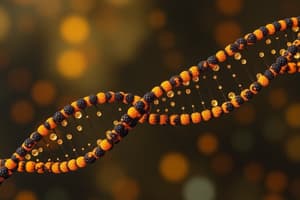Podcast
Questions and Answers
What is the primary focus of biochemistry?
What is the primary focus of biochemistry?
- Study of ecosystems and environmental relationships
- Genetic manipulation of organisms
- Chemical processes within living organisms (correct)
- Interactions between plants and animals
Which of the following is not a subfield of biology?
Which of the following is not a subfield of biology?
- Genetics (correct)
- Ecology
- Microbiology
- Botany
What type of reproduction involves two parents?
What type of reproduction involves two parents?
- Binary fission
- Sexual reproduction (correct)
- Cloning
- Asexual reproduction
Which process describes the ability of organisms to maintain stable internal conditions?
Which process describes the ability of organisms to maintain stable internal conditions?
What does the theory of evolution primarily explain?
What does the theory of evolution primarily explain?
What key area does biotechnology focus on?
What key area does biotechnology focus on?
In which emerging area is personalized medicine located?
In which emerging area is personalized medicine located?
Which of the following is an example of a prokaryotic organism?
Which of the following is an example of a prokaryotic organism?
Flashcards are hidden until you start studying
Study Notes
Overview of Bio
- Definition: Bio refers to the study of life and living organisms, encompassing various fields like biology, biochemistry, and biotechnology.
Key Concepts
-
Biology:
- Study of living organisms and their interactions with the environment.
- Divided into subfields:
- Botany: Study of plants.
- Zoology: Study of animals.
- Microbiology: Study of microorganisms.
- Ecology: Study of ecosystems and environmental relationships.
-
Biochemistry:
- Focuses on the chemical processes within and related to living organisms.
- Key concepts include:
- Enzymes: Catalysts in biochemical reactions.
- Metabolism: Sum of all chemical reactions in a cell.
- DNA/RNA: Genetic material and its functions.
-
Biotechnology:
- Application of biological systems or organisms to develop products.
- Key areas include:
- Genetic engineering: Manipulating DNA to create desired traits.
- Pharmaceuticals: Developing drugs and therapies using biological substances.
- Agriculture: Enhancing crop yields through GMOs.
Fundamental Processes in Bio
-
Cellular Biology:
- Study of cell structure and function.
- Types of cells:
- Prokaryotic: Simple, no nucleus (e.g., bacteria).
- Eukaryotic: Complex, with nucleus (e.g., plants, animals).
-
Homeostasis:
- The ability of organisms to maintain stable internal conditions despite external changes.
-
Reproduction:
- Processes by which organisms produce new individuals.
- Types:
- Asexual: Single organism reproduces (e.g., binary fission).
- Sexual: Involves two parents (e.g., fertilization).
Evolutionary Biology
- Theory of Evolution:
- Explains the diversity of life through natural selection.
- Key concepts:
- Adaptation: Changes in traits that enhance survival and reproduction.
- Speciation: Formation of new species through evolution.
Importance of Bio
- Health: Understanding diseases, developing treatments, and promoting wellness.
- Environment: Addressing ecological issues and promoting sustainability.
- Agriculture: Enhancing food production and security through biotechnology.
Emerging Areas
- Synthetic Biology: Combining biology and engineering to design new biological parts and systems.
- Personalized Medicine: Tailoring medical treatment based on individual genetic profiles.
Conclusion
- Bio encompasses a wide range of studies related to life and its processes.
- Its applications impact health, environment, and technology, making it a crucial field of research.
Overview of Bio
- Bio studies life and living organisms, intersecting various fields like biology, biochemistry, and biotechnology.
Key Concepts
-
Biology:
- Investigates living organisms and their environmental interactions.
- Subfields include:
- Botany: Focuses on plant life.
- Zoology: Concerns animal studies.
- Microbiology: Examines microorganisms.
- Ecology: Explores ecosystem dynamics and environmental relationships.
-
Biochemistry:
- Examines chemical processes in living organisms.
- Key aspects include:
- Enzymes: Act as catalysts in biochemical reactions.
- Metabolism: Encompasses all chemical reactions within a cell.
- DNA/RNA: Represents genetic material essential for various functions.
-
Biotechnology:
- Utilizes biological systems for product development.
- Major focus areas:
- Genetic engineering: Alters DNA to achieve specific traits.
- Pharmaceuticals: Involves drug and therapy development using biological components.
- Agriculture: Uses GMOs to increase crop productivity.
Fundamental Processes in Bio
-
Cellular Biology:
- Analyzes cell structure and function.
- Cell types:
- Prokaryotic cells: Simple structure without a nucleus (e.g., bacteria).
- Eukaryotic cells: Complex structure with a nucleus (e.g., plants, animals).
-
Homeostasis:
- Refers to organisms’ ability to maintain stable internal conditions despite external fluctuations.
-
Reproduction:
- Mechanisms for producing new individuals.
- Types include:
- Asexual reproduction: Single organism produces offspring (e.g., binary fission).
- Sexual reproduction: Involves two parents contributing genetic material (e.g., fertilization).
Evolutionary Biology
- Theory of Evolution:
- Accounts for life's diversity through natural selection.
- Essential concepts:
- Adaptation: Trait changes boosting survival and reproduction chances.
- Speciation: Development of new species via evolutionary processes.
Importance of Bio
- Health: Critical for disease understanding, treatment development, and wellness promotion.
- Environment: Essential for tackling ecological challenges and advocating for sustainability.
- Agriculture: Vital for enhancing food production and securing food resources using biotechnology.
Emerging Areas
- Synthetic Biology: Merges biology with engineering to create new biological entities and systems.
- Personalized Medicine: Develops tailored medical treatments based on individuals' genetic information.
Conclusion
- Bio encompasses extensive studies related to life processes, with significant implications for health, environmental sustainability, and technological advancement.
Studying That Suits You
Use AI to generate personalized quizzes and flashcards to suit your learning preferences.




